|
|
|
Sort Order |
|
|
|
Items / Page
|
|
|
|
|
|
|
| Srl | Item |
| 1 |
ID:
174782


|
|
|
|
|
| Summary/Abstract |
What has China learned from the ‘Century of Humiliation’? In China’s mnemonic practices, ‘the backward will be beaten,’ which attributes the nation’s humiliation experiences to economic, military, and technological backwardness, is the most significant ‘lesson from past’ required to be remembered. Bridging the literatures on memory, nationalism, and International Relations (IR), this study conducts a detailed analysis of the making of ‘the backward will be beaten’ and examines how it helps shape China’s perception of national security based on a competitive worldview and its associated nationalist visions. This study also identifies alternative discourses that challenge the dominant historical lesson by intellectuals and netizens. It contributes to a nuanced understanding of the collective memory of the Century of Humiliation and its implications for Chinese nationalism and foreign relations.
|
|
|
|
|
|
|
|
|
|
|
|
|
|
|
|
| 2 |
ID:
174778
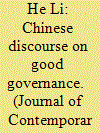

|
|
|
|
|
| Summary/Abstract |
Since Xi Jinping came to power in 2012, governance reform and innovation have become a central pillar of China’s grand strategy. Meanwhile, the debate on good governance gained momentum among the Chinese intellectuals ranging from the proponents of good governance, New Leftists, liberals, champions of political meritocracy, and advocates of the Singapore model. This study uses content analysis to examine the works by leading Chinese scholars and other primary materials. This study finds that the Chinese intellectual discourse on governance is a double-edged sword. It has generated some important theoretical rendering and practical designs of the governance reforms that the Party-state could cherry-pick., Yet, the enhanced governance capacity could help the regime build up legitimacy without convergence to liberal democracy.
|
|
|
|
|
|
|
|
|
|
|
|
|
|
|
|
| 3 |
ID:
174784


|
|
|
|
|
| Summary/Abstract |
China’s growing economic strength provides Beijing with potent instruments of economic statecraft to pursue political and strategic objectives. Yet studies of economic power and Chinese economic statecraft tend to concentrate on trade in goods, outbound investment, and international institutions. This article broadens this research program into trade in services by focusing on China’s outbound tourism sector. Drawing on a variety of Chinese and English language sources, the authors describe the history and structure of the domestic regulatory framework governing Chinese outbound tourism, before studying instances where the government has apparently intervened for strategic purposes. By unpacking how Chinese consumers arrange overseas holidays, this article provides insights into how the market structure of this service industry creates both opportunities for and constraints on China’s economic power.
|
|
|
|
|
|
|
|
|
|
|
|
|
|
|
|
| 4 |
ID:
174780
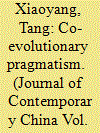

|
|
|
|
|
| Summary/Abstract |
There is a gap between the elusive concept of Beijing Consensus and China’s effective practices to promote economic growth at home and in other countries. This article aims to expound this phenomenon by examining both the rationale underlying China’s structural transformation and the corresponding practices in development cooperation. Using a case study on the evolution of infrastructure construction within China and abroad, this article argues that China's success has little to do with a new pattern of state capitalism, but rather presents a different manner of understanding and facilitating modernization. Target-oriented non-linear synergism can drive comprehensive transformation more effectively in developing countries than model-oriented linear mechanism. With a consistent goal, the pragmatic thinking enables multiple stakeholders to coevolve in diverse contexts through open attitude.
|
|
|
|
|
|
|
|
|
|
|
|
|
|
|
|
| 5 |
ID:
174785
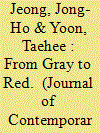

|
|
|
|
|
| Summary/Abstract |
The representative migrant enclave in Beijing, Zhejiangcun, was a ‘gray’ lawless zone outside the ‘red’ socialist order from the perspective of the Chinese Communist Party, subject to the government’s crackdown and demolition. However, Zhejiangcun surprised everyone by developing into a ‘red’ space through the grassroots Party-building by its peasant migrant businessmen, starting with the establishment of Beijing’s first Party branch of floating Party members in 1995 which now commands 26 Party branches. This article examines this astounding transformation of Zhejiangcun from ‘gray’ to ‘red,’ by providing answers to how Zhejiangcun was able to construct and develop a Party organization even before the ‘Three Represents’ and, in turn, how this Party organization contributed to the success and survival of Zhejiangcun’s migrant businessmen.
|
|
|
|
|
|
|
|
|
|
|
|
|
|
|
|
| 6 |
ID:
174777
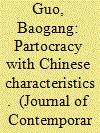

|
|
|
|
|
| Summary/Abstract |
Regime resilience is a frequent theme in Chinese political research. This article examines China’s latest effort to enhance the regime’s political stability by modernizing its governance system. It argues that China’s current governance system reform has institutionalized the Chinese party-state and transformed it into a partocracy. Partocracy, as a new analytical model, can be very useful but is still underdeveloped. The case presented in this article will reveal some of the main features of the emerging Chinese partocracy. It shows that the governance system reform undertook by Xi Jinping has begun the process of institutionalizing, rationalizing, and legalizing the old party-state system. By examining these latest developments, the author hopes to stimulate more interest in the study of partocracy as an analytic model.
|
|
|
|
|
|
|
|
|
|
|
|
|
|
|
|
| 7 |
ID:
174783
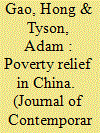

|
|
|
|
|
| Summary/Abstract |
Evidence from Gansu, Hunan, Shandong, and Yunnan provinces shows that subnational authorities in China draw on personal relations to alleviate poverty and legitimize their rule. Through an invasive process of claiming kin, local government officials are required to sign kinship contracts with poor households. The contract links bureaucratic performance reviews to tangible outcomes, creating new incentives and pressures for officials to help lift their adopted families out of poverty. The general aspiration may be to improve bureaucratic processes by establishing direct, transparent connections between state and society, however the authors contend that the invasive and personalized nature of the kinship policy risks disrupting the existing social order and complicating local poverty relief efforts, leading to local variance, extortion and other irregularities.
|
|
|
|
|
|
|
|
|
|
|
|
|
|
|
|
| 8 |
ID:
174779


|
|
|
|
|
| Summary/Abstract |
This article analyzes changing patterns of leadership with a special focus on the re-centralization and re-personalization of Chinese politics as initiated under Xi Jinping. Going beyond the categorization of personalistic rule, it argues that the construction of visionary, futuristic governance ideas—as illustrated by the opening of Xiong’an New Area in 2017/2018—are part of a transformational leadership mode. Xiong’an is constructed as a test lab for Chinese AI innovation and a model city unit of green urbanization, illustrating the political leaders’ will to engage in all-encompassing reforms. By framing Xiong’an as a presidential signature initiative, potential risks and implications for the party-state’s long-term regime legitimacy, in case of unexpected delays or implementation complications, are reduced to a minimum.
|
|
|
|
|
|
|
|
|
|
|
|
|
|
|
|
| 9 |
ID:
174781


|
|
|
|
|
| Summary/Abstract |
China’s engagement in South Sudan has been branded a crucial test case for the country’s foreign and security policy in Africa. Investment in the oil sector is significant, and Chinese political engagement in conflict mediation and peacekeeping are unparalleled. Will the experiences gathered provide China with reasons to extend its engagement, is South Sudan a model or exceptional case? In this context three sectors will be explored: the economic, political and security sphere. This article finds that there are few reasons to assume that South Sudan is a role model. Access to oil was never critically important, and oil revenue is fuelling the conflict. The Chinese model of developmental peace and conflict mediation preferring non-punitive diplomacy are problematic. The peacekeeping mission could not stop the fighting but succeeded in setting up civilian protection sites. In sum, the South Sudan engagement has not produced favorable outcomes and is unlikely to be replicated.
|
|
|
|
|
|
|
|
|
|
|
|
|
|
|
|
|
|
|
|
|